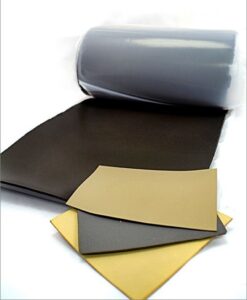How do you decide which EMI silicones to buy? Price, minimum order quantity, and delivery times are important, but you also need to see technical data and test results. Specialty Silicone Products (SSP) puts this information on its website, and it’s available for download 24/7. Keep reading to see out what you’ll find when you look for products on SSP’s EMI RFI silicones page.
Technical Data Sheets
SSP provides a technical data sheet (TDS) for each EMI RFI silicone. In addition to durometer, fill material, and color, you’ll find material specifications such as tensile strength, elongation percentage, tear strength, and specific gravity. You’ll also find volume resistivity, a measure of conductivity through the material, and shielding effectiveness measurements in decibels (dB).
Third-Party Shielding Reports
SSP also shares third-party shielding effectiveness test reports for many of its EMI elastomers. These tests are performed by accredited testing laboratories like D.L.S. Electronic Systems and to standards such as MIL-DTL-83528. Because SSP shares the full testing reports online, you can see complete information such as minimum and best-case attenuation levels, and shielding effectiveness at different frequencies.
Qualified Product Listing (QPL) Letters
Some of SSP’s EMI shielding silicones are part of Qualified Products List (QPL) 83528 from the U.S. Department of Defense. These MIL-DTL-83528 EMI silicones have been approved by the Defense Logistics Agency (DLA). DLA’s notification letters to SSP are available for download.
UL 94 V0 Test Results
Several of SSP’s EMI shielding silicones meet the requirements of UL-94 V0, a stringent flammability standard from Underwriters Laboratories (UL). SSP shares its UL test results online, including vertical burn tests for specimens with different thicknesses. SSP’s nickel-graphite-filled flame-retardant silicones are offsets to and replacements for discontinued materials from W.L. Gore & Associates.
Third-Party Outgassing Reports
Outgassing is a problem in high-vacuum environments such as outer space because released gases can condense upon and cloud sensitive devices such as camera lenses. SSP makes low-outgassing EMI silicones and shares the independent test reports for these materials. Pacific Testing Laboratories has tested several SSP products according to ASTM E595 requirements, a standard that originated with NASA.
Salt Spray Tests
Galvanic corrosion is an electrochemical process that occurs when two different metals are in contact in a saltwater environment. This form of corrosion causes unwanted pitting. SSP makes EMI shielding silicones that can withstand marine environments and shares the results of salt spray testing for nickel-aluminum-filled and nickel-graphite-filled materials.
Compression Deflection Data
ASTM D575 is a testing standard that’s used to determine the stiffness of rubber materials in compression. SSP provides compression deflection data for several of its EMI silicones to help engineers and buyers source the right materials for gasketing. Compression deflection is a measurement of the force required to compress a material a set amount, and it’s typically given on a curve.
Safety Data Sheets
In addition, SSP provides safety data sheets (SDS) with identification and hazard identification information about all of its EMI silicones. For more information about these and other SSP materials, or to request a quote, contact SSP online or email Dominic Testo, SSP’s Business Development Manager.




